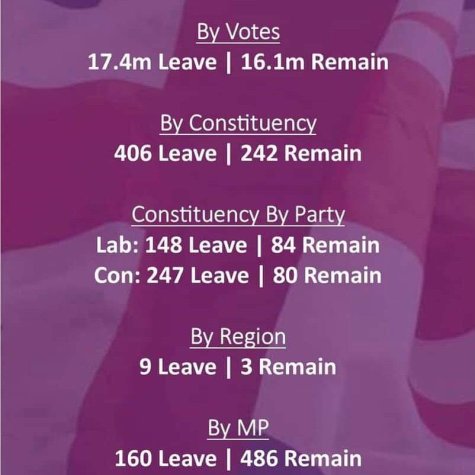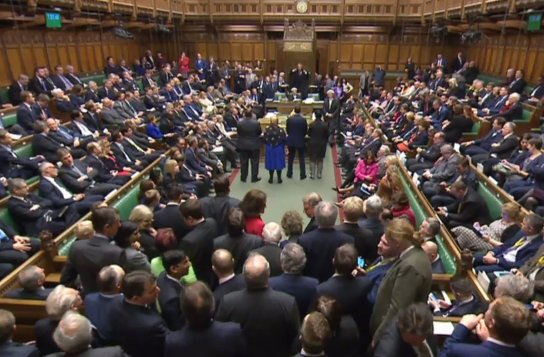Note: this article was originally published at The Conservative Woman on Tuesday 21 April 2020
Choosing five recent key Brexit-relevant story headlines which, while not necessarily meriting a full-length article, nevertheless warrant two or three paragraphs of comment, rather than merely a couple of lines.
(NB: (£) denotes article behind paywall.)
Frost and Barnier agree UK-EU FTA Timetable – Guido Fawkes
Far from acquiescing to the persistent, disingenuous pleas of the Continuity-Remain lobby for the suspension of negotiations with Brussels and the deferment of Brexit via an extension to the Transition period, the Number 10 team appears to be both ramping them up and tightening the schedule. Perhaps it was lucky that our chief negotiator had his brush with coronavirus early on during the outbreak, rather than now.
It’s also maybe no coincidence that this happened during the week that the PM’s top adviser/chief of staff Dominic Cummings returned to Downing Street after his own bout of COVID-19, and almost immediately upped the pressure on Brussels by not only categorically ruling out an extension but also gearing up preparations for a No Deal Brexit on 31 December.
Government rejects IMF advice to extend Brexit transition period – Telegraph (£)
‘We will not ask to extend the transition period, and if the EU asks, we will say no.’
How gratifying it was to read such an unequivocal response from Number 10 to the unsolicited ‘advice’ of the same IMF which, in 2016 when headed by the Christine Lagarde now spooking the financial markets by failing as head of the ECB to deal adequately with the burgeoning euro crisis, participated enthusiastically in George Osborne’s anti-Brexit Project Fear, and endorsed his Treasury’s wildly inaccurate forecasts of the economic Armageddon which it claimed would surely ensue from merely a vote to leave.
The IMF has no formal relationship to the EU, and certainly has no, in effect, locus standi in UK-EU negotiations. In addition, the present incumbent, Bulgaria’s Kristalina Georgieva, being a former both Eurocrat and Vice-President of the unelected EU Commission presided over by the invariably well-refreshed Jean-Claude Juncker might suggest that its ‘advice’ was not entirely impartial, and had more to do with pro-Brussels politicking than a concern for trade uncertainty.
Even if this were not the case, the IMF itself is much diminished and discredited; it has been ever since its own watchdog revealed in 2016 the extent to which its management had played down the structural flaws and unemployment effects of the Euro because of its ideological commitment to the EU Project, and allowed European Union insiders to exploit the Fund’s resources to rescue their own deficient currency union and banking system.
A Brexit Tutorial – Briefings for Britain
Amid the demands for an extension of the Brexit Transition period from unreconciled Remainers/Rejoiners shamelessly seizing on the coronavirus outbreak as an excuse to at least defer, but preferably halt, Britain’s full and final exit from the EU, comes a timely reminder of why the millions of people who voted for it, but whose opinions are under-represented in the political, media, cultural, business and academic environments where EU-philes cluster, did so.
Despite the vote for Brexit having been dismissed by its opponents as a somehow democratically illegitimate expression of insular ignorance and prejudice, the serious psephological and sociological analysis that now exists shows it to have been the predictable consequence of major social and political changes, occurring over a long period, which disproportionately benefited a minority metropolitan elite and managerial overclass.
As the political beneficiary of the ballot-box revolt against that overclass, the current government should be aware that to accede to its current demands to halt Brexit would be the first step on the road to political defeat.
Europe apologises to Italy: von der Leyen – Ansa English edition
‘When sorrows come, they come not single spies, but in battalions.‘
With –
- the UK’s resolve that, come what may, there will be no extended Transition period showing that Brexit is not going according to Brussels’ preferred script;
- the EU’s centralised authority in pieces as its member countries’ governments unilaterally decide their individual coronavirus response policies to protect their citizens at nation-state level without even consulting it; and
- the Eurozone facing imminent crisis as its more fiscally-precarious economies struggle to cope with the effects of their COVID-19 lockdowns,
von der Leyen could well have contemplated the inherent truth of Claudius’ words in Shakespeare’s Hamlet as she felt the need to apologise in the EU Parliament for its cavalier treatment of Italy during the early stages of the outbreak.
Yet her patently untrue, arguably even semi-deluded, assertion that ‘Europe has become the world’s beating heart of solidarity‘ suggested that, even in the present circumstances, a supranationalist, integrationist pan-Europeanism still dominates her Commission’s thinking. Britain should not hesitate to emphasise to the Brussels negotiators that concluding a fast-track trade agreement with us will let the EU cross off Brexit as a subject and concentrate on addressing its internal troubles.
Four reasons why leaving the EU will help us recover from the lockdown quicker – Telegraph (£)
The UK Government’s lockdown is deliberately inducing a severe recession; but already some of the support for small businesses announced by the Chancellor in his package of measures is reportedly being prevented by EU rules on state aid from reaching their intended beneficiaries, needlessly exacerbating their difficulties. Furthermore, for as long as we remain in Transition, we remain subject to EU single-market regulations, when we might conceivably want to eliminate tariffs to counter a rise in food prices caused by falling production.
As if those factors weren’t enough, if Transition is extended, we remain liable for continuing financial contributions to the EU as a matter of routine, before any additional contribution to an EU bailout of the struggling economies on its southern fringe, as well as a rescue of the Eurozone itself. If we are to have the least worst option of a V-shaped recovery from the coronavirus pandemic, we can ill afford to be committing funds to an institution trying to make it as difficult as possible for us to complete our exit and to disadvantage us in the process. There is every reason, not to delay our final departure, but to accelerate it.
Thoroughly agree with this article? Vehemently disagree with it?
Scroll down to leave a comment






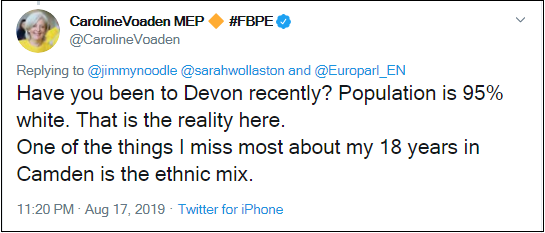
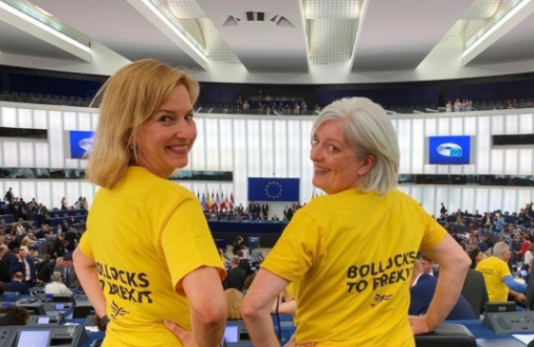

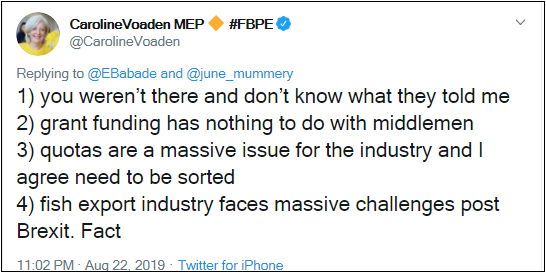
 Huge numbers of the 17.4 million who voted Leave, despite being disparaged as uneducated, stupid and bigoted, actually understood this, instinctively and viscerally, even if they couldn’t all necessarily articulate it lucidly. They knew what was, and still is, at stake. That’s why
Huge numbers of the 17.4 million who voted Leave, despite being disparaged as uneducated, stupid and bigoted, actually understood this, instinctively and viscerally, even if they couldn’t all necessarily articulate it lucidly. They knew what was, and still is, at stake. That’s why 
 Economically, fiscal rigour and low taxes were out, “spending the proceeds of growth” was in. Socially, the Left’s ‘liberal’-‘progressive’ social justice warrior agenda was enthusiastically embraced, not just in its good parts, but in many of its worst aspects as well. Green-ery was accorded the status of incontestable truth, challenging which was tantamount to heresy.
Economically, fiscal rigour and low taxes were out, “spending the proceeds of growth” was in. Socially, the Left’s ‘liberal’-‘progressive’ social justice warrior agenda was enthusiastically embraced, not just in its good parts, but in many of its worst aspects as well. Green-ery was accorded the status of incontestable truth, challenging which was tantamount to heresy.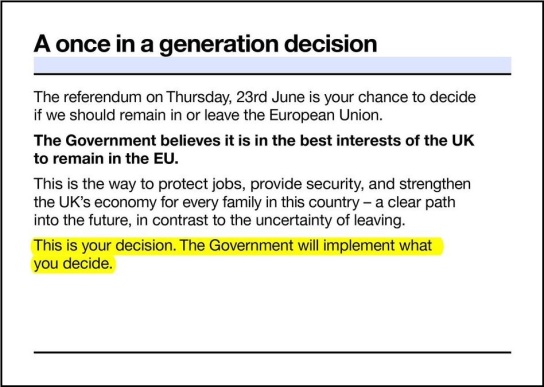


 So, David Cameron, abandon, even if only briefly, your your lucrative but reclusive existence in your
So, David Cameron, abandon, even if only briefly, your your lucrative but reclusive existence in your 